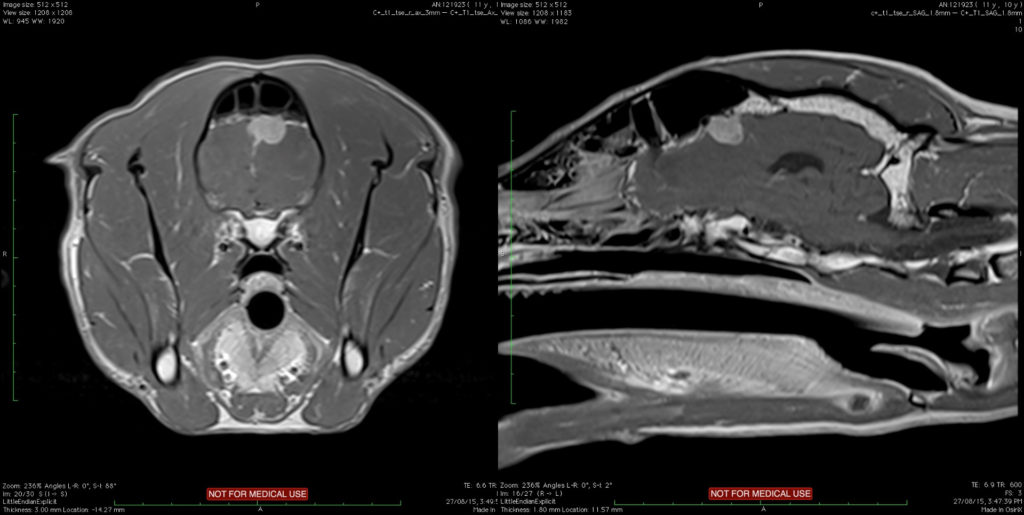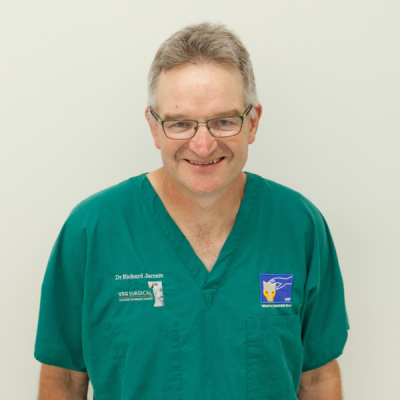
Many people are often surprised to hear that we see animals with brain tumours. I think this is probably because years ago we had no way of diagnosing these challenging cases. Nowadays, fortunately, we have excellent access to the advanced imaging techniques commonly used in human medicine such as CT (computed tomography) and MRI (magnetic resonance imaging). Although dogs and cats require sedation or anaesthesia for these procedures, they are now used commonly for problems associated with the head and neck including the brain.
Brain tumours can either be primary, where they originate in the brain or secondary, where they spread to the brain from other parts of the body. The symptoms that we normally observe in animals with brain tumours are seizures (fits), behavioural changes, obsessive pacing or circling, apparent blindness, loss of balance, and an unusual way of walking. Most brain tumours occur in older dogs and the presence of seizures is often misdiagnosed as epilepsy. Epilepsy more commonly begins at an early age and would be extremely unusual to commence in a dog greater than five years of age.
The diagnosis of a brain tumour begins with a full physical and neurologic examination followed by blood tests and chest x-rays. The blood tests are used to determine whether there is any evidence of liver disease (which can cause seizures) or other general health problems. The chest x-rays help to rule out the presence of cancer in the lungs that may have spread to the brain. Ultimately, the diagnosis is made by MRI or CT scans. MRI generally provides a more detailed examination of the brain but is slightly more expensive than the CT scans. Biopsy of a brain tumour is difficult due to the overlying skull so a final diagnosis is often based on the size and location of the tumour. A biopsy is always obtained if the animal has surgery.
Treatment of brain tumours often depends on the location of the tumour and the severity of the symptoms. Animals with a brain tumour located in the front part of the brain near or on the surface are often candidates for surgical treatment. Surgery involves opening the skull under general anaesthesia and removing the tumour or as much of the tumour as possible. While there are risks associated with brain surgery, most animals have a rapid recovery and can have their lifespan extended for some time.
Radiation therapy has also been reported to successfully manage brain tumours and VSA now offers this modality in Auckland using state-of-the-art facilities at Auckland Radiation Oncology ( ARO) at Mercy Hospital. We have successfully now treated two dogs with brain tumours (and one dog with bone cancer) that were non-operable. This treatment is a truly international collaborative effort using a veterinary radiation oncologist in Brisbane for planning and the expert human team at ARO for application of the radiation treatment.
Drug therapy (chemotherapy) has also been used to manage some types of brain tumour with reasonable success. This type of therapy is most commonly utilised for tumours that are deep within the brain and not candidates for surgery or radiation therapy. Some owners choose to use palliative care only and manage the symptoms with corticosteroids to reduce brain swelling and medication to control the seizures.
The prognosis for brain tumours is variable depending on the type of tumour. The prognosis for secondary brain tumours is poor as this indicates spread of cancer throughout the body. The prognosis for meningioma (a brain tumour normally identified on the surface of the brain) is up to 12-18 months with good quality of life following surgery and radiation therapy. Information about the prognosis of deeper brain tumours is lacking but surgery, radiation, and chemotherapy options appear to extend the quality of life.
Over the past few years, we have treated a number of tumours of the brain and skull with surgery and the ability of these animals to recover and lead normal happy lives following the procedures is remarkable. Unfortunately, it is doubtful that we ever completely cure an animal with a brain tumour but we are definitely able to improve their quality of life for a considerable time.

DR RICHARD JERRAM
Richard graduated from Veterinary School at Massey University in Palmerston North with a Bachelor of Veterinary Science in 1987. He spent seven…


